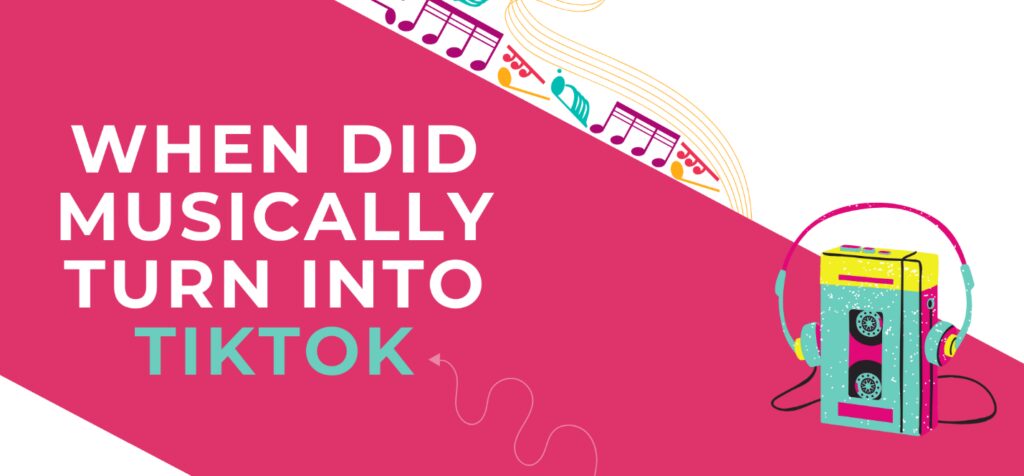When Did Musically Turn Into TikTok?

TikTok is one of the world's most popular social media apps, with over 1 million monthly active users. How did they do it? When did Musically turn into TikTok, you may wonder? The app now allows users to create and share short videos, often featuring lip-sync battles, dancing, comedy, and other creative content.
But how did TikTok become such a phenomenon?
The Birth of Musical.ly: The Platform Users Created
TikTok's origin can be traced back to 2014, when two Chinese entrepreneurs, Alex Zhu and Luyu Yang, launched a video-based app called Musical.ly. The app was initially designed as an educational platform where users could watch short videos on various topics.
However, Zhu and Yang soon realized that the app was not attracting enough users and decided to pivot to a more entertainment-focused app.
They noticed that many users were using the app to create lip-syncing videos, where they would mime the lyrics of popular songs. Zhu and Yang embraced this trend and added features that would make it easier for users to create lip-syncing content. They also partnered with major music labels and artists to provide users with a large and diverse music catalog.
Musical.ly gained popularity, especially among young users in the other key markets (especially the US market). The app became a platform for users to express themselves, showcase their talents, and connect with other users. Musical.ly also spawned many viral challenges, trending songs, and stars like Baby Ariel, Jacob Sartorius, and Loren Gray.
When did Musically Turn into TikTok?
When Musical.ly became TikTok, it was a merger between two short-form video apps in 2017. ByteDance, China based company, acquired Musical.ly. TikTok was similar to Musical.ly but had more features, such as live videos, filters, stickers, and artificial intelligence (AI) that could personalize video recommendations based on the user's viewing preferences.
In 2018, ByteDance decided to merge Musical.ly and TikTok into a single app under the name TikTok. The company said the integration was a "natural fit" as both were similar apps and had a shared mission and vision of empowering users to create and share short video clips. The company also said the merger would allow people to access more content, features, and creators worldwide.
The merger was accompanied by a significant redesign, which included a new logo, interface, and functions for the application. The app also introduced a new feature called 'For You," which used AI to curate feed personalization of videos for each user based on their viewing preferences, behavior, and location.
A Brand New Application
The new TikTok app quickly achieved mainstream success, attracting millions of new users and becoming one of the most downloaded apps in the world. The app also continued to innovate and add new features, such as duets, reactions, hashtags, effects, and more. TikTok also became a platform for discovering and creating recent music trends, such as the "Old Town Road" remix by Lil Nas X, the "Say So" dance by Doja Cat, and the "Savage" challenge by Megan Thee Stallion.
TikTok has also faced some challenges and competition from other social media platforms, such as Facebook, Instagram, and YouTube, which have launched or improved their own short-form video features, such as Reels, Stories, and Shorts. TikTok has responded by continuing to innovate and add new features, such as TikTok Shop, TikTok Resumes, and TikTok Stories, to attract and retain its users and creators.
However, these features also mean that the competition for attention and engagement on TikTok is fiercer than ever. That's why some savvy creators have opted to buy TikTok views from Views4You, a reliable and affordable digital solutions provider that can boost their visibility and reach on the platform.
TikTok's Features
TikTok's main features can be divided into lip-syncing features and personalized video recommendations.
Lip Sync Battle
This TikTok content allows you to create short-form videos where you can lip-sync to songs, dialogues, sounds, and other audio clips. Users can choose from a vast library of soundtracks or upload their own.
Content creators can also edit their videos by adding pre-set filters, effects, stickers, text, and more. TikTokers can also record videos in one or multiple shots and use features such as slow motion, time-lapse, and reverse to enhance their videos.
TikTok's lip-syncing content is popular among people who want to express themselves, have fun, and showcase their talents. Creators can also use these features to participate in various challenges, trends, and memes created and shared by other users. TikTokers can also interact with each other by viewing, dueting, reacting, commenting, and messaging on their videos.
Personalized Video Recommendations
The TikTok app's personalized video recommendations are powered by AI, which analyzes the user's preferences, behavior, and location to provide a customized feed of videos for user accounts. With this, TikTok users can access this feed by swiping up on the "For You" tab, which shows various videos from different categories, such as comedy, music, dance, sports, beauty, and more. Users can also browse popular and trending videos by swiping left on the "Discover" tab, which shows videos based on hashtags, topics, and events.
This feature is popular among TikTok creators who want to discover new and relevant content and explore different genres and styles of videos. People can also use these recommendations to find and follow new creators and get inspired by their videos. People can also interact with the videos by liking, commenting, sharing, and saving them.
Integration with Major Broadcasting Networks and Apple Music
Since the time Musical.ly turned into TikTok, the app has improved. TikTok has integrated with major broadcasting networks and Apple Music to provide more exposure and opportunities for its users and creators.
For example, TikTok has partnered with NBC, MTV, and iHeartRadio to produce and broadcast live and exclusive events, such as the "TikTok Live: Summer Song" concert, the "TikTok Live: Countdown to 2024" show, and the "TikTok Live: Music Awards" ceremony. These events feature popular TikTok stars, celebrities, and musicians, allowing people to watch and interact with them on the app.
TikTok has also partnered with Apple Music to allow creators to access and stream songs from the app directly. Viewers can also see which songs are trending on TikTok and discover new music and artists. This integration also benefits musicians and artists, who can gain more exposure and fans through TikTok and earn royalties from Apple Music.
TikTok's Controversies
Despite its popularity and success, TikTok has also faced several controversies and criticisms, especially regarding its data privacy, content moderation, and political influence. For example, the Chinese government charges TikTok with collecting and sharing user data, censoring content that is critical of China, and influencing the US presidential election in 2020.
TikTok has also been banned or restricted in some countries, such as India, Pakistan, and Indonesia, due to various reasons such as national security, cultural norms, illegal data collection, and religious values.
TikTok has denied these allegations and claimed that it respects and protects its users' privacy and freedom of expression and operates as an independent platform from the Chinese government. TikTok has also improved its transparency and accountability by publishing its community guidelines, content moderation policies, and data security practices and creating a trust and safety advisory council, a transparency center, and a creator fund.
Frequently Asked Questions
What is TikTok?
TikTok is a video-based app that allows users to create and share short video clips. It was created by the Chinese company ByteDance and was officially launched in September 2016. The first version of the app began as a lip-syncing called Musical.ly, but it has since evolved into a platform that allows people to create a wide variety of content.
When did Musically turn into TikTok?
Musical.ly became TikTok on August 2018. The parent company, ByteDance, acquired Musical.ly in November 2017 and made a decision to combine it with their current application, TikTok. The new app and official version combined the popular elements of both apps. They allowed users to uniquely interact with each other through group video chatting and streaming live videos.
Who are Alex Zhu and Luyu Yang?
Luyu Yang and Alex Zhu are Musical.ly's co-founders. They created the first prototype of the app in 2014 called "Ping Pong." The app allowed people to choose soundtracks and add pre-set filters to short lip sync videos. The app has become incredibly popular among young people, particularly Chinese teens.
What is the Difference Between Musical.ly and TikTok?
Musical.ly was primarily a lip-syncing app, while TikTok allows users to create a variety of content. TikTok also has more advanced features, integrating ByteDance's global leading digital solutions.
Share this Entry
Business directory
Our Community Partners







